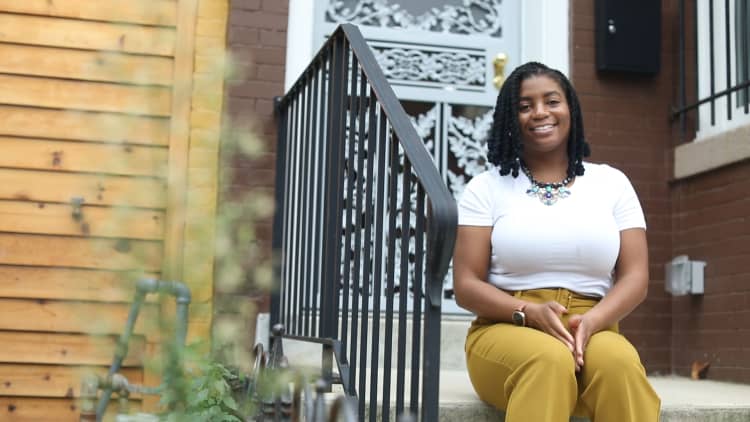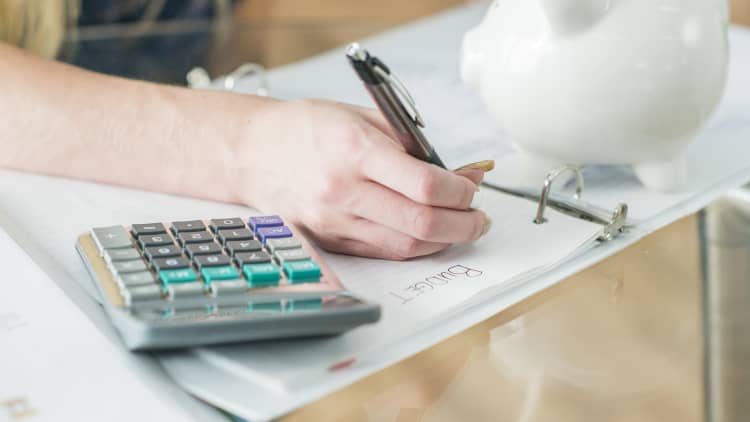My parents always joked, "Money doesn't buy happiness, but let's find out just to be sure."
As it turns out, much of what we know about the link between money and well-being is oversimplified. Money can buy happiness, and not just when it affords us the security of having enough to pay the bills or save for the future. As an April 2019 study found, "Changes in life satisfaction are associated with changes in consumption, not changes in income." Despite the recent trend toward minimalism, it seems that buying stuff makes us happy.
While we may be reluctant to admit it, there's benefit to acknowledging the influence of consumption on our happiness. Namely, when we're willing to understand and work with the complexities of our financial behaviors, we may have a better chance at improving our habits.
"I do believe that yes, money can buy you happiness," Ramit Sethi, author of the New York Times best seller, "I Will Teach You to Be Rich," tells CNBC Make It. "And personally, I don't want to have to skip 2,500 avocado toasts and 12,000 lattes so that maybe in three million years I can finally start living my life."
Personal finance experts often argue that spending money on experiences can be one of the best ways to buy happiness. This might mean saving for a vacation, getting groceries delivered or hiring a housekeeper. A poll by Harris Group found that 72% of millennials prefer spending on experiences over material objects, and a series of studies from Cornell found that subjects were indeed happier spending their money this way.
However, this outcome varies depending on your financial background, argues Wendy Wood, a professor of psychology and business at the University of Southern California and author of the forthcoming book, "Good Habits, Bad Habits: The Psychology of Making Positive Changes That Stick," "This simple answer to the question of how to best spend your money doesn't consider the huge economic disparities in our society," she tells CNBC Make It.
Along with Jacob Lee of the Ulsan National Institute of Science and Technology and Deborah Hall of Arizona State University, Dr. Wood and her colleagues studied how social class determines purchase happiness. Their research found that people who were less financially advantaged (partially measured by income, occupation and education) reported just as much, if not more, happiness from spending on material objects over experiences. This was true for both short- and long-term happiness. "People of higher social class have an abundance of resources, which means they can afford to focus more on internal growth and self-development," Dr. Wood says.
People who were less financially advantaged (partially measured by income, occupation, and education) reported just as much if not more happiness from spending on material objects over experiences.
In other words, the more financially advantaged you are, the more likely you already have the material goods you want, which then shifts your consumer values to experiences. But Roger Ma, an NYC-based certified financial planner and founder of Life Laid Out, says that thinking about spending in terms of experiences versus objects may be limiting. "I like going to nice restaurants and travelling, and I would probably choose those over buying a fancy piece of clothing or bag," Ma tells CNBC Make It. "But material goods could in fact add a lot of value to your life on a daily basis than those experiences."
The flatscreen TV, for example, buys the experience of binge-watching your favorite show, then talking about that show with your friends. Traditional financial advice like "don't buy the latte" is problematic because it's so general and doesn't take into account the highly subjective and personal relationship between your own spending and happiness.
If spending $4 on your daily boba tea makes you happy, who's to say that's wrong? When people judge our spending habits, it can feel like a judgement on our values — almost like they're telling us we're approaching happiness wrong. Especially if you already feel financially stressed, as so many of us are, it's exhausting to feel the need to justify every dollar you spend in the name of personal comfort.
But the truth is, your overall financial health is important, too. There are certain approaches to personal finance that might work better with all of this in mind.
Start with a solid foundation
While spending does make us happy, financial security also has an impact on our well-being. "As an advisor, I want to support someone where they're at. But I also think we can take steps to curate the kind of life we want not just now, but also in the future," Jenny Meassick, a financial advisor in Philadelphia, tells CNBC Make It.

To strike a healthy balance between spending today and saving for tomorrow, you need a solid financial defense, Meassick says. That means having an emergency fund, for example, or a debt payoff plan. "These basics can be hard for people to swallow because oftentimes they're just trying to get out of living paycheck-to-paycheck," Meassick said. But without that foundation, the happiness you get from spending might feel diluted.
Think of it as self-care, which often doesn't feel great in the moment — getting up early for a workout when all you want to do is sleep in, for example — but you're taking care of your basic needs by buffering yourself from financial harm.
Do a spending audit
Spending makes us happy, but to maximize our enjoyment from it, most of us could stand to spend more mindfully. Ma works with clients to look at their last three months of expenses and audit them. You can try this exercise, too. Look at your bank and credit card statements and review a handful of your latest purchases. Of course, there are things we need to spend money on that don't feel great, like getting your car fixed or sending in a student loan payment. But what about your discretionary spending — which purchases made you happy? Would you spend that money again? The goal of the exercise is to pinpoint the spending you enjoy the most.
"If you start with what you actually love spending money on, it makes the exercise of budgeting or cutting back on other areas easier," Ma says.
Focus on big wins
"I encourage my readers to ignore the $3 questions like, 'Should I buy this coffee?' and instead think more deeply about the big wins," Sethi says. He defines "big wins" as financial moves that have the most meaningful impact on your overall finances. This might be automating your savings, increasing your salary or finding better savings interest rates.
This concept can work with frugality, too. If spending makes you happy, cutting back on larger expenses, like housing, might make more sense, Sethi explains. While it seems like downsizing would be the bigger sacrifice, it's a painful decision you have to make once, rather than deciding whether or not to deprive yourself of a small slice of happiness every Friday when you skip your latte. "Focus on the big wins and move on with your life," he advises.
"Ignore the $3 questions like, 'Should I buy this coffee?' and instead think more deeply about the big wins,"Ramit SethiAuthor, "I Will Teach You to Be Rich"
Set a limit for obligatory spending
Since money buys happiness, it's easy to see how using your discretionary funds on someone else's terms can lead to resentment. For instance, maybe you and your spouse buy happiness in entirely different ways — you enjoy spending on restaurants, while the thought of forking over $75 on dinner makes her uneasy. She'd rather use that money for saving for a home. Another common scenario: A friend invites you to her wedding, and you feel obligated to go, but the thought of paying $1,500 for flights, lodging and gifts makes your stomach churn. How do you balance other people's priorities with your own?
Set some limits. Decide on an amount you feel comfortable spending each month or year, whether it's friends' weddings or a partner's restaurant habit. You'll feel less resentful about the spending when you're prepared for it. If that earmarked money runs out, you may need to tell your friend you don't have the budget to attend her wedding, but you can make up for it in other ways, like taking her to a nice dinner next time she's in town. Your own limits will vary, depending on the situation, but the gist of it is: Figure out what you're willing to spend on other people, then stick to that budget to avoid any resentment and animosity. And remember, it's okay to decide you don't want to spend your money on something you don't feel like you can truly afford.
Money itself doesn't make us happy, but the opportunities we have and decisions we make with it can have a big impact on our well-being. "It comes back to envisioning your ideal life beyond money," Ma says, whether that's changing jobs, retiring early, traveling or spending more time with your family. But your routine happiness is also worth considering, whether it's spending $15 for a salad at your favorite lunch spot, paying for cable so you can watch TV with your spouse after a long day or splurging on a new pair of designer shoes.
"The first step is figuring out what you want your life to look like," Ma says. "Then the question is, what kind of goals can you make and how can money help you get there?"
Like this story? Subscribe to CNBC Make It on YouTube!
Don't miss: The job people are least likely to quit pays more than $100,000


